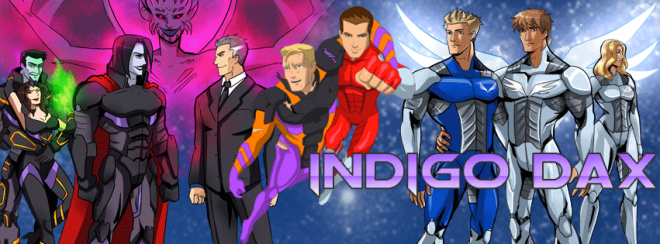
Last month, it was announced that DC Comics is winding up "Midnighter," a comic with a gay lead character, and this has saddened a lot of people in the LGBT community. Comic book author Bryan Pierce hopes that one day his graphic novel "Indigo Dax" will fill the void created by the cancellation of "Midnighter."
Pierce has always been a fan of science fiction and fantasy, and one of the driving forces behind the creation of "Indigo Dax" is the author's desire to represent the gay community in the genre.
In a chat with International Business Times India, Pierce spoke about his desire to see more gay superheroes in comics, as he feels the LGBT community isn't well-represented in the mainstream media.
"As a gay man, I rarely get to see gay characters in the media," Pierce said. "Sure gay characters are becoming more common, but most of the time they are really just side characters. When I was shopping around my story to bloggers and news organizations I got criticism for using a gay male lead for the novelty factor. Which really struck a cord with me, because being gay has never been a novelty to me, It's who I am, and in a large way, this is my story told through fantasy."
Pierce worked in corporate America for about 14 years before he quit his job to become a full-time author. Here, he talks about his transformation into an author, challenges he faced, and the need for more gay superheroes.
IBT: Can you tell us something about how you became a comic book author?
I started writing my graphic novel in October of 2013.I started out writing the backstory on my computer. I realised that my mind saw the story in images rather than just words. Hiring artists to draw the concept art brought my characters to life. They made them more tangible for me. It allowed me to write out their backstory more easily. I found the more I wrote, the less I felt like I was making the story up in my head, and more just telling the story of these characters. Almost as if they were real in my head.
I ended up quitting my job in corporate America the last day of February 2015. I was determined to complete the graphic novel and make that my primary career. It was a risk, but at the same time it felt meant to be.
IBT: Could you please elaborate on the challenges of being an independent author?
I think the biggest challenge being an independent author is getting that initial break through. There are thousands of aspiring authors. All of them are just as passionate about their story as I am. So I think a big part of my challenge is to persuade enough people to take a look at my story.
IBT: Although Indigo Dax is science fiction, does it focus on LGBT issues?
Using the framework of fantasy, I was able to tackle a lot of topics from politics, to social commentary, and LGBT issues. I really take the time to show how even the strongest person would be worn down by the harassment, and general lack of concern shown towards gay people. I also show what a world might be like, where being gay isn't really thought of as a big deal at all. That's ultimately the goal, to see our humanity, before our sexuality.
IBT: Do you identify with any of the characters in the book?
I think one of the best things about writing this story is that all the characters are a part of me. The main character Dax is probably the closest to me. He is my better, more enlightened side. The part of me that can detach from the moment and see the world with compassion. With the villains I got to tap into my most selfish and self serving aspects of myself. I could explore my darker side.
IBT: As you might be aware, there's an online campaign urging Disney to give Queen Elsa of "Frozen" a girlfriend. What's you take on the whole movement?
I think movements like these are awesome! Anytime there is public awareness of bringing gay characters into the mainstream, I'm all for that. It's not just about having a token gay person, it's about accepting us into the fabric of humanity.
IBT: Lastly, why should straight people care about gay superheroes?
For a long time, being called gay has been used as a weapon straight men have used against other men to prove their masculinity. I recently read a Reddit post where a straight man was so afraid he might be gay that he was considering suicide. That's the mindset we are up against.
The more gay people are seen in the media, the more gay people are accepted into the broader society it takes the fear and stigma away from being gay. Exposure to gay people means that straight men don't have to fear the unknown, but can make better decisions for themselves on what they like and don't like. It means that straight men can express themselves more freely without the fear of being labelled gay. In a perfect world everyone would respond with, "So what?!" if someone accused them of being gay. We're not there yet, but someday we will be.




![Diljit Dosanjh slips and falls on stage during Ahmedabad show due to an oil release by fire; handles the situation like a pro [Watch] Diljit Dosanjh slips and falls on stage during Ahmedabad show due to an oil release by fire; handles the situation like a pro [Watch]](https://data1.ibtimes.co.in/en/full/806580/diljit-dosanjh-slips-falls-stage-during-ahmedabad-show-due-oil-release-by-fire-handles.jpg?w=220&h=135&l=50&t=40)











![Diljit Dosanjh slips and falls on stage during Ahmedabad show due to an oil release by fire; handles the situation like a pro [Watch]](https://data1.ibtimes.co.in/en/full/806580/diljit-dosanjh-slips-falls-stage-during-ahmedabad-show-due-oil-release-by-fire-handles.jpg?w=220&h=135)
